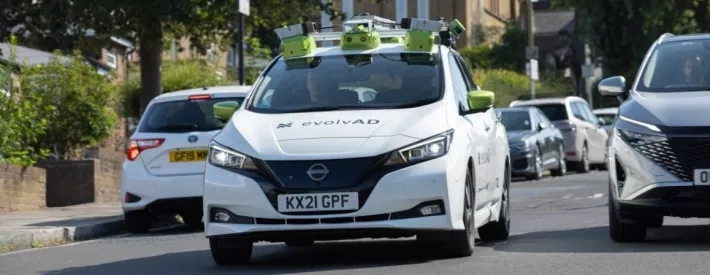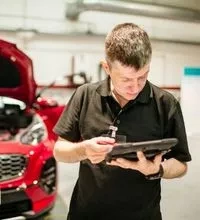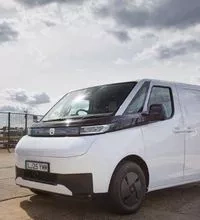Testing autonomous technology

ADAS and autonomous technology needs thorough testing to ensure it’s safe to use. The UK is a critical part of Nissan's development programme, where traffic and pedestrian activity isn’t like anything found in either the US or Japan.
Described as the most rigorous self-driving trial ever conducted in the UK, the Nissan-led evolvAD project was designed to bring autonomous mobility closer to reality as part of the manufacturer's vision for a safer, cleaner and more inclusive world.
Announcing its launch in 2023, then Chancellor of the Exchequer, Jeremy Hunt, said: “By supporting the industries of the future, we are delivering on our plan to make the UK the best place in the world to start and grow a business.”
Over the following 21 months, a consortium including Connected Places Catapult, Humanising Autonomy, SBD Automotive and TRL, backed by the government’s Centre for Connected and Autonomous Vehicles, used a small fleet of modified Leaf EVs with trained safety drivers to conduct thousands of miles of automated driving.
Robert Bateman, evolvAD Project Manager at Nissan Technical Centre Europe, explained: “Since 2017, we’ve been working for a group in Japan on autonomous vehicles. The first project was HumanDrive, which mainly involved motorway driving.
“Then, from 2020-23, we did ServCity in Greenwich, using the Smart Mobility Living Lab (SMLL). That was a significant progression – driving on arterial roads, dealing with more roadside furniture and a lot more pedestrians. The logical next step was last miles – getting from a rural village onto a motorway or navigating a small urban side street. That was the purpose of evolvAD.”
Urban challenges included speedbumps, mini-roundabouts, width restrictions and oncoming traffic, while rural challenges included tight country lanes with extreme cambers and blind bends.
“We also test in the US and Japan, but there are features specific to the UK which are harder to handle than the wide roads and bright sunshine of Silicon Valley,” said Bateman. “Our colleagues were initially quite shocked when they saw pedestrians dashing out in front of the car, not even at a crossing – people just don’t do that in Yokohama! Nissan realised the UK was the best place to test.”
To mark the successful completion of evolvAD, in March, Nissan invited 93-year-old grandfather-of-five Brad Ashton – a retired comedy scriptwriter who prepared material for Groucho Marx, Tommy Cooper and Les Dawson – to take an autonomous ride.
“I’ve always wondered what the cars of the future would be like, and this is it,” he said. “It was exciting travelling on these winding country roads with the team. I thought I would feel frightened or worried, but I felt safe and relaxed throughout.
“People like me that depend on a car, or that can’t drive, will benefit from this tech to help them stay in touch with friends and family, to keep them from feeling isolated, particularly in rural areas where there are fewer transport options.”
An associated evolvAD survey of 1,000 people aged over 70, by OnePoll, found that 64% said they’d like “the tech of the future” to help people stay independent. 67% said a chance to ride in a self-driving car would make them feel nervous.
Clearly there’s much work still to do, on infrastructure readiness and regulation, as well as on the public perception front. Still, evolvAD is a great demonstration of current capabilities.
Sarah Jones MP, Minister for Industry, said: "The UK is home to a world-class automotive sector, and I'm pleased this project has brought autonomous vehicles one step closer to reality."
David Moss, Nissan’s Senior Vice-President for the AMIEO region, added: “It has been a privilege working with our dedicated partners to advance automated mobility. As well as making driving safer by reducing human error, and cleaner by improving efficiency, this technology can give many more people access to mobility who may not have it today due to location, age or disability.”
In April, there was another notable development. Nissan announced that, from 2027, its next generation ProPILOT technology will feature software by London-based Wayve. Last year the self-driving AI specialist secured $1.05bn in funding from companies including Microsoft and chipmaker Nvidia. Perhaps the future is closer than you think.
Getting fully autonomous vehicles on public roads is a time consuming and challenging task, but the UK is playing a major role in making it happen.




